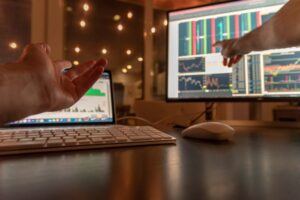Share this article:
Your Psychology is One of the Most Important Aspects of Trading
It's tough. It's stressful. And it can be downright heartbreaking if you don't know what you're doing. Trading is a high stakes game, and to expect yourself to play well without the right knowledge would be foolish at best, and dangerous at worst.
But there are ways to change your trading psychology so that trading becomes less of a gamble, and more of a science-backed process that will help make your day trading experience as successful as possible! In this post we'll cover three research backed ways to change your trading psychology:

Upgrading your trading psychology doesn't have to be difficult. There are many proven methods that will help you to do so and transform your trading as a result.
Identify Your Emotional Triggers
Identifying your emotional triggers while trading is important because it will allow you to avoid your emotions from influencing the decisions that you make while trading. The next time a trade goes against your expectations, ask yourself: "What emotional trigger just happened?"
It's likely that one of these triggers is activating and potentially leading to negative consequences like loss aversion, overconfidence bias or fear of missing out.
Take note of what worked (or didn't) in order to better prepare for future trades that may involve similar circumstances. For example, if you're triggered by feelings of regret when losses happen then try adjusting stop-loss orders on new positions because this could lead to an unwanted psychological association with those particular emotional responses.
When combined together with behavior change techniques discussed later in this article you will start to develop a reliable process to keep your emotions in check while you are trading.
Control Your Emotions With Breathing Exercises and Mindfulness Techniques
When done consistently, mental exercises are some of the most powerful things that you can do to control fear/greed when trading. For example, they can help you to easily enter into the peak performance state every time you sit down to trade. Also, they can help you to develop the patience that you need to wait for your A+ setups instead of forcing action because you are bored or because other emotions are getting in the way.
Mindful breathing:
Have you ever heard of the Wim Hof method? It is a breathing exercise that is used to increase your body's resistance towards stress. Mindful breathing can result in increased circulation, reduced blood pressure levels, strengthened immune system and slowed heart rate ̶ all just by following this practice for 20 minutes every day!
What does this mean for your trading? Put simply, it means that you will feel more relaxed during your trading sessions. Trading naturally has ups and downs but with this simple breathing technique you will find that fear and anxiety will decrease greatly leading to less mistakes in execution.
Tapping:
Tapping is a mental exercise that you probably may not have heard of before. It is what we use at Tradechology to help our traders maximize their potential. Tapping using a combination of kinesthetic tapping on the desk along with behavior change audios to transform the way you approach trading. To write about it doesn't give it justice. It is something that you must experience to see the benefits. If you are interested, here is a link to try it out on your own.
Change The Way You Think About Your Trading Psychology
With the proper tools you can change the way you think about trading. This is important because the way you think about trading will impact the psychology.
It's time to take control of your emotions and manage them in a healthy manner so that they don't get the best of you as you trade.

Sign Up and Subscribe for quick updates!
Enter your name and email below to get notified of when the next blog post is released. It’s that easy.
Share this article:

PRODUCT
RESOURCES
We are not Financial Advisors or a Broker/Dealer: Neither Tradechology nor any of its officers, employees, representatives, agents, or independent contractors are, in such capacities, licensed financial advisors, registered investment advisers, or registered broker-dealers. MLH Capital does not provide investment or financial advice or make investment recommendations, nor is it in the business of transacting trades, nor does it direct client commodity accounts or give commodity trading advice tailored to any particular client’s situation. Nothing contained in this communication constitutes a solicitation, recommendation, promotion, endorsement, or offer by MLH Capital of any particular security, transaction, or investment.
Securities Used as Examples: The securities used in this example are used for illustrative purposes only. The calculation used to determine the return on investment “ROI” does not include the number of trades, commissions, or any other factors used to determine ROI. The ROI calculation measures the profitability of investment and, as such, there are alternate methods to calculate/express it. All information provided are for educational purposes only and does not imply, express, or guarantee future returns. Past performance shown in examples may not be indicative of future performance. Testimonials appearing on this website may not be representative of other clients or customers and is not a guarantee of future performance or success.
Investing Risk: Trading securities can involve high risk and the loss of any funds invested. Investment information provided may not be appropriate for all investors and is provided without respect to individual investor financial sophistication, financial situation, investing time horizon, or risk tolerance.
Testimonials appearing on this website may not be representative of other clients or customers and is not a guarantee of future performance or success



